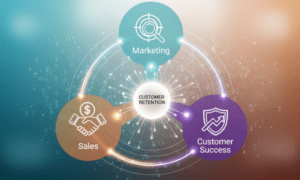Welcome to a new era of customer relationships in the hospitality industry, where data revolutionizes marketing. No more generic preferences; discover data-driven marketing for unforgettable experiences. Join us as we explore personalized recommendations, targeted campaigns, and seamless communication, creating unrivaled guest connections. Unlock the secrets behind transforming customer relationships through data-driven marketing!
Introduction to Data Analytics in the Hospitality Industry
Data analytics is critical for understanding customers and making informed decisions in hospitality. Track behavior, preferences, and feedback to tailor offerings for specific market segments.
Improve customer service by identifying and addressing potential issues, increasing satisfaction and loyalty. Understand operations and performance to identify areas for improvement.
Data analytics is a powerful tool to transform customer relationships and drive growth in hospitality.
Benefits of Data-Driven Marketing for Hospitality Businesses
Data-driven marketing is a term for marketing decisions and activities that are based on data and analytics. The goal of data-driven marketing is to use data to improve marketing performance and ROI.
There are many benefits of data-driven marketing for hospitality businesses. Hospitality businesses collect a lot of data, including customer data, booking data, and guest feedback. This data can be used to improve marketing strategies and tactics.
Data-driven marketing can help hospitality businesses segment their customers and target them with more relevant messages. Segmentation allows businesses to focus on a specific group of customers with similar needs and interests. This makes it easier to create personalized messages that are more likely to resonate with the target audience.
Data-driven marketing can also help hospitality businesses track the performance of their marketing campaigns. By tracking campaign performance, businesses can identify what’s working and what’s not working. They can then make adjustments to optimize their campaigns for better results.
Data-driven marketing can help hospitality businesses improve their customer relationships by providing insights that can be used to create more personalized and relevant customer experiences.
How to Analyze and Leverage Customer Data
In order to analyze and leverage customer data, hospitality businesses need to invest in data-driven marketing tools and strategies. By doing so, they can identify customer trends and preferences, target specific segments with tailored messages, and track the performance of their marketing campaigns. Additionally, data-driven marketing can help hospitality businesses improve their overall customer relationships by providing insights that can be used to shape future interactions.
When it comes to analyzing customer data, there are a few key things that hospitality businesses should keep in mind. First, they need to make sure that they have access to accurate and up-to-date information. This can be achieved by investing in quality data collection and management tools. Second, they need to define what types of analysis will be most helpful in achieving their desired outcomes. This might include things like segmentation analysis, customer journey mapping, or even A/B testing. They need to ensure that they have the resources in place to actually carry out the analysis (e.g., trained staff, adequate computing power, etc.).
Once the customer data has been analyzed, it’s time to start leveraging it to improve the hospitality business’s marketing efforts. One way to do this is by using the insights gained from the analysis to create more targeted and effective marketing campaigns. For example, if a segmentation analysis reveals that there are distinct groups of customers with different needs and preferences, the business can create separate marketing campaigns for each group. Another way to leverage customer data is by using it to personalize the guest experience. By understanding each guest’s preferences and past interactions with the brand, businesses can provide more tailored services and recommendations.
The Role of Technology in Developing Personalized Experiences
Technology has always played a role in developing personalized experiences, but with the advent of big data and artificial intelligence (AI), it is now possible to create even more customized and targeted experiences for guests. Hospitality businesses are using data-driven marketing to collect information about their guests’ preferences and behaviors to create tailored marketing campaigns and guest services that will keep them coming back.
Some of the ways that hospitality businesses are using technology to create personalized experiences include:
Collecting data about guests: Hotels, restaurants, and other hospitality businesses are using data collection tools like loyalty programs, surveys, and Wi-Fi analytics to gather information about their guests. This data is then used to create profiles of each guest so that businesses can better understand their needs and preferences.
Using artificial intelligence: AI is being used to help hospitality businesses automate tasks like customer service, marketing, and operations. For example, many hotels are now using chatbots to handle basic customer service inquiries so that staff can focus on more complex tasks. AI can also be used to generate targeted marketing campaigns based on a guest’s previous interactions with the brand.
Creating mobile apps: Mobile apps provide an easy way for guests to access information about a hotel or restaurant, book reservations, and more. Additionally, many apps now offer features that allow businesses to personalize the user experience by providing recommendations based on the user’s location or past interactions with the app.
Common Challenges Facing the Hospitality Industry
The hospitality industry is constantly changing and evolving, which can present challenges for businesses trying to keep up. Here are some of the most common challenges facing the hospitality industry:
Increasing competition: The hospitality industry is becoming increasingly competitive, with new businesses popping up all the time. This can make it difficult to stand out from the crowd and attract customers.
Changing customer expectations: Customers’ expectations are constantly changing, and they are becoming more demanding. Hospitality businesses need to be able to anticipate these changes and adapt their offerings accordingly.
Rising costs: The cost of doing business in the hospitality industry is constantly rising, due to factors such as inflation and increases in the cost of labor. This can squeeze profit margins and make it difficult to maintain a competitive price point.
Rapid technological change: Technology is changing at a rapid pace, and hospitality businesses need to keep up to remain relevant. This includes investing in new systems and training staff on how to use them effectively.
Social media: Social media has become a powerful marketing tool, but it can also be a double-edged sword. On one hand, it can be used to reach a wider audience quickly and easily; on the other hand, negative reviews or comments can spread just as quickly and damage a business’s reputation.
Strategies for Improving Customer Relationships
There are a number of strategies that hospitality businesses can use to improve customer relationships. One key strategy is to focus on data-driven marketing. By collecting data about customer preferences and behaviors, businesses can more effectively target their marketing efforts. Additionally, businesses can use customer feedback to improve the quality of their products and services.
Another strategy for improving customer relationships is to provide excellent customer service. This includes responding quickly to customer inquiries and concerns, as well as addressing problems in a timely and efficient manner. Additionally, businesses should aim to create a positive and welcoming environment for customers.
It is also important for businesses to build loyalty programs that encourage customers to keep coming back. Loyalty programs can offer discounts, exclusive offers, and other perks that make customers feel valued. When designed and implemented correctly, loyalty programs can be an effective way to improve customer retention rates.
Conclusion
As the hospitality industry continues to grow, data-driven marketing is becoming an increasingly important part of transforming customer relationships. By collecting and analyzing data from customers, businesses are able to understand their needs better and provide them with personalized services that create more meaningful and lasting relationships with their customers. Data-driven marketing also allows for improved communication between businesses and customers, which can help build trust and loyalty over time. With so many advantages to using data-driven marketing in the hospitality industry, it’s no wonder why this type of strategy is becoming a popular choice among companies looking to stay ahead of the competition.”



































